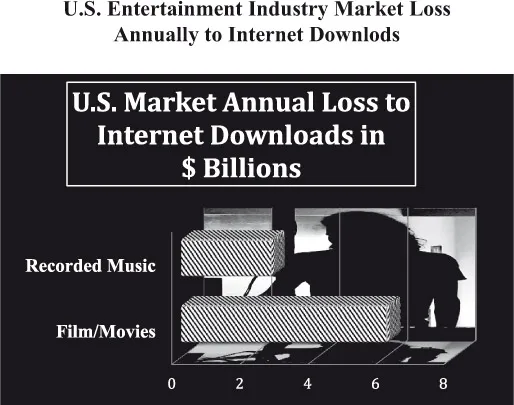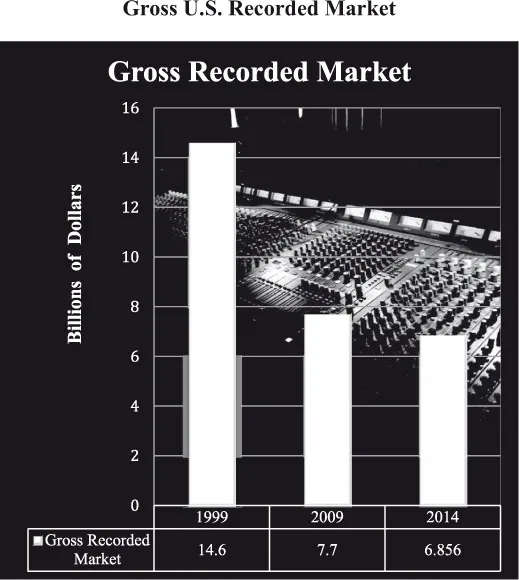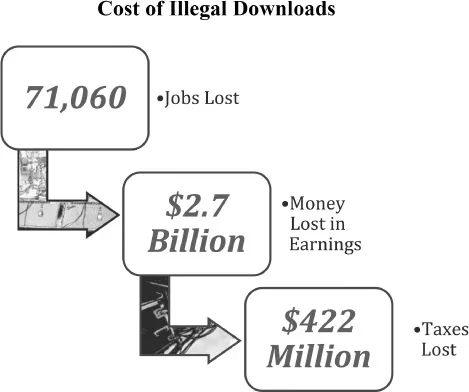![]()
I am a member of the pirate generation. When I arrived at college in 1997, I had never heard of an MP3. By the end of my first term I had filled my 2-gigabyte hard drive with hundreds of bootlegged songs. By graduation, I had six 20 gigabyte drives of music, nearly 15,000 albums’ worth … I pirated on an industrial scale, but told no one … The files were procured in chat channels, and through Napster and BitTorrent; I haven’t purchased an album with my own money since the turn of the millennium.1
—Stephen Witt
In the United States only, which is about one-third of the world’s entertainment product market, record companies lose almost $3 billion per year from illegal downloads. The film industry loses almost $6 billion every year, which is twice as bad for investors and production companies (Figure 1.1).
The old music industry is dead. We’re standing in the ruins of a business built on private jets, Cristal, $18 CDs and million-dollar recording budgets. We’re in the midst of the greatest music industry disruption of the past 100 years. A fundamental shift has occurred—a shift that Millennials are driving. For the first time, record sales aren’t enough to make an artist’s career, and they certainly aren’t enough to ensure success. The old music industry clung desperately to sales to survive, but that model is long gone.2
—Honeyman
Figure 1.1 The annual loss to the music industry is about $2.7 billion in earnings (RIAA 2015), and about $6.1 billion in gross income to the film and movie industry (MPAA 2015), as stated in the article “Film Piracy, A Threat to the Entire Music Industry.”
The sale of recordings is only a small part of the music industry; however, when we are talking billions, it still means real money (see Figure 1.2). The music industry has lost almost two-thirds of its markets to illegal downloads. Once again, the investors who put millions into the marketing and the recordings have lost the incentive to invest in prerecorded music. Now, the industry has forced the labels to refocus on branding and touring to recover their investments.
Figure 1.2 Recorded music sales have dropped from $14.6 billion in the United States in 1999 to only $6.85 billion in 2014.
I Disagree
The music industry has hit the skids, but by changing its business model, it is starting to make money again. Because people still want to listen to great music, the industry will find a way to profit from its investments as long as laws can be enforced. However, it won’t be easy! Selling albums at retail outlets is largely a thing of the past; digital downloads of albums or singles on Internet provider sites, such as iTunes or Amazon.com, reign now, but who can say what the next way we will consume and enjoy music will be. What might strike you as the uncertainty facing us in the entertainment industry is a very natural process of change that in the end will be creative, innovative, and profitable. Or at least, I hope it will be and you should, too!
As you read this book, you’ll start to understand the process of creative destruction and the rebirth of the new music industry and you’ll be able to see how these changes are also trends in the entire entertainment industry. We have to hope the U.S. Congress and others who control and regulate the entertainment industry will continue to re-evaluate the balance between free markets, the innovations technology brings to the creation and delivery of entertainment products, and the need to protect and insure the honest financial rewards creative individuals so richly deserve. Things are changing at all levels of the industry, from the types of recording artists labels sign to the production methods used to create entertainment products and the distribution of movies. The old industry isn’t dead; it’s just morphing into an opportunity to build the new industry based on the best of the past and the opportunities we’ll discover in the future. However, there are some serious lessons about the uses of new technologies, software, entrepreneurship, ethics, creativity, and laws that we may need to understand if the new industry—whatever that will be—is to survive.
301 Special Report: The Office of the President of the United States
This chapter started with four versions of where the entertainment industry appears to be in the 21st century: illegal Internet downloads; significant lost revenue for traditional entertainment industry products and their creators; almost predictable drops in record sales as personal devices replace radios and record players in homes; and an awareness among artists that there has to be change in order for the entertainment industry to survive. Think about the implications of all these things coming together at one time in one industry. Are Witt, who seems at least to be an honest crook, and people like him, who have downloaded entertainment products without paying for them because they were “free,” acting like thieves, pirates, or Robin Hood, stealing from the rich to support their passion to be entertained? Do you think they even consider the impact of their actions on the artists whose works they are so eager to have? And even if they do, who cares about the long-term impact of what they have taken? Did anybody really get hurt when Witt downloaded music in his home to listen to for his own enjoyment? And, if we were to ask him or anyone who has done the same thing, we might hear a response along the lines of “Well, it’s out there, isn’t it, and no one says I can’t.” Right! Why should anyone care if we shoot a video, mix in a major hit, and upload it to YouTube.com or any of the other thousands of worldwide sites? Besides, it was just for us anyway and we didn’t sell the video with the original recording, so we didn’t make any money.
If I had a buck for every time I’ve heard those types of statements, I’d own a sailboat in the Caribbean and could probably buy an island next to billionaire Sir Richard Branson. The fact is that when Witt illegally downloaded a song, the songwriter, music publisher, label, and recording artist each lost a few pennies. So you do the math—when a million or so people illegally download that same recording the creative careers of the individuals who wrote and sang the tracks and the company who invested its money into it are destroyed. Sadly, this is a world problem that must be addressed, with a growing significance to the extent that the president of the United States commissioned a specific report on the consequences of patent and trademark infringement as well as copyright infringement just to try to understand it better. The Special Report From the Office of the President of the United States (2015) states,
The problems of trademark counterfeiting and copyright piracy continue on a global scale and involve the mass production and sale of a vast array of fake goods and a range of copyright-protected content pirated in various forms. Counterfeited goods include semiconductors and other electronics, chemicals, automotive and aircraft parts, medicines, food and beverages, household consumer products, personal care products, apparel and footwear, toys, and sporting goods.
… consumers, legitimate producers, and governments are harmed by trademark counterfeiting and copyright piracy … Producers and their employees face diminished revenue and investment incentives, an adverse employment impact, and loss of reputation.3
Let’s translate what the report says into the economic impact on jobs, profits, and lost taxes (Figure 1.3).
Figure 1.3 The cost of Internet illegal downloads is serious for several reasons, including the loss of over 71,000 jobs, $2.7 billion in earnings, and $422 million in taxes.
The Insider’s Perspective
Honestly, many industry insiders are frustrated by the public’s lack of understanding about how the entertainment and music industry works. Such is a gap I am hoping to fill with this book. In these pages, I am inviting you to think deeply and critically about the current and future states of the entertainment and music industry. I’m assuming you are reading this book because you, as I did, want to be part of the dynamic world of creating and valuing entertainment products that, put simply, make our lives a whole lot better. There are not many things we can say with certainty, but one thing is for sure—we love our movies, books, TV shows, and, above all, our music. So, one of the biggest challenges facing the entertainment and music industry today is how to keep making money, how to keep the business alive, in the face of the popularity of streaming, and other new forms of entertainment delivery. The culture of the entertainment industry is changing, and you need to know the processes, laws, and practices that have shaped it, where things stand now, and then use what you have learned to make the industries what you want them to be! Fasten your seatbelts and let’s get moving. But first, here’s a little about me.
I’ve spent most of my adult life meeting personalities and industry insiders, working as a bad producer and a pass-ible audio engineer. I’ve gotten to know people all across the entertainment industry; some are friends and others are my colleagues and may one day become yours. All of us are especially interested in understanding and sustaining the entertainment industry. I’m always the student and the artists and entertainment leaders are always the professors. I’ve never asked for an autograph or picture. I’m simply not interested in the glitz and glamor. I’m a voting member of the Grammy Awards, and I have found most of the people in this industry to be bright, talented, often humble, passionate people. Sure, there are a few jerks, but they are usually not among superstars or top executives. In addition, most artists are also business people. Some great, some naïve, and some awful until they learn from the school of hard knocks that they better get it together if they want to get paid anything for their art. Because consumers can opt to “own” a CD or a DVD through downloading, artists have to think about how they can prevent or at least affect any amateur’s (called wannabes in the industry) use of digital entertainment products that the artists have worked hard to create. Wannabes make it tougher for new and established artists to maintain economic success because the amateur’s product, usually made with the same or similar recording tools, is rarely at the same level of quality as the professionals’ works. Wannabes upload what they have created on the same platforms the professionals use, but they give it away to get noticed, creating a larger swamp of thick oak moss that makes it harder to find the quality products. The consumer may or may not have the experience or the interest to distinguish between the work of a professional and that of a wannabe, because the consumer wants the pleasure, the experience, of the creative work.
“Taking Care of Business”
As part of my professional training and experience in the music industry, I developed a psychographic research method that allowed me to provide image-consulting research for MCA and Word Records’ recording artists. My interest is in understanding not what people buy or are attracted to as consumers but why they buy it or are drawn to it, by analyzing where people live, how much education they have, and how what other kinds of things they buy might influence why they buy a music or entertainment product. For instance, a person who buys tickets to an NFL season might also own a Volvo, or a Prius, or a Harley motorcycle. What do these things have in common? Such are the variables that make psychographic research challenging, as there are many things shaping why someone would buy something that do and don’t compare with their other buying habits. In other words, you don’t have to own cats or like the opera to admire the work of British composer Sir Andrew Lloyd Webber. However, at some level the common consumer preferences come together and we discover that the guy who rode the Harley to the football game likes a certain type of beer and the rugged, outdoor, rebellious-attitude lifestyle “hero” or “villain” found in the images of heavy metal rock (when young and older 55+, as an example), and country music acts with a rebellious image when they are middle-aged. And there you have it, the connection between teenage males (heavy metal fans) to middle-aged male fans who relate to country music. We can also find out where they live by using computer-marketing software, down to the...



